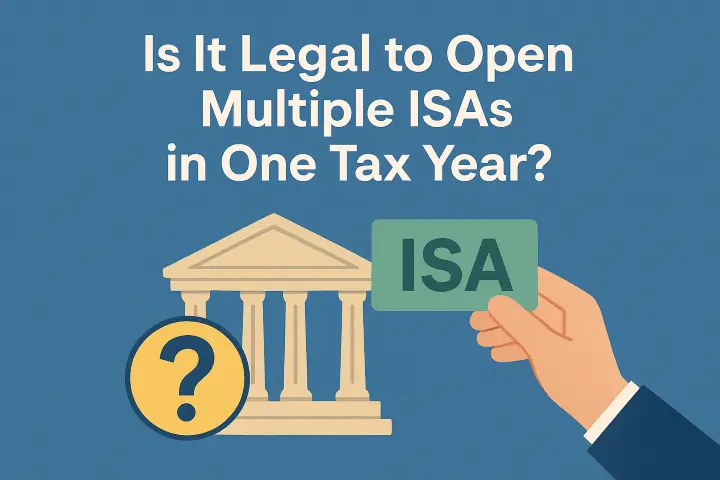Thinking of opening another ISA, but not sure if that’s allowed? Could opening another ISA account in the same tax year get you in trouble?
These questions disturb many people who are just starting out at ISA investments.
While Individual Savings Accounts are a useful way to save or invest your money without paying tax, but the rules around them can be confusing. Many people aren’t sure if they’re allowed to open multiple ISAs in the same tax year.

The simple answer is yes—but there are rules about how you do it. In this guide, we’ll explain which ISAs you can open, how they work, and what to watch out for.
Benefits of Multiple ISAs
Many people stick to just one ISA type because it feels simple. But having multiple ISAs—as long as they’re different types—can give you more choice, flexibility, and potential benefits.
1. Balance Safety and Growth
You can split your money between different ISA types to get the best of both worlds:
Cash ISA → Safe, low-risk savings with easy access
Stocks and Shares ISA → Higher growth potential over the long term
This way, part of your savings stays protected while the other part has a chance to grow faster.
2. Take Advantage of Different Features
Each ISA type has its own perks. For example:
Lifetime ISA (LISA) → 25% government bonus for first home or retirement savings
Stocks and Shares ISA → Tax-free investing in shares, funds, and bonds
By combining them, you can get both the government bonus and tax-free growth.
3. Diversify Your Money
Having multiple ISAs allows you to spread your savings and investments across different areas:
Cash
Shares
Bonds
Peer-to-peer loans (through an Innovative Finance ISA)
If one area doesn’t do well, the others can help balance things out.
4. Gain More Flexibility
Different ISA types have different access rules:
Cash ISAs → Quick withdrawals, great for emergency funds
Stocks and Shares ISAs → Better for long-term goals
LISAs → Locked until you buy your first home or turn 60 (with a bonus)
By splitting your allowance, you can have some money ready for short-term needs and some set aside for the future.
In short: The right mix of ISAs can work together to match your financial goals be it safety, growth, tax savings, or all three. Just be careful to follow HMRC’s one-per-type rule.
Types of ISAs You Can Open
There are four main types of ISAs available to UK residents:
- Cash ISA
A personal savings account where you earn tax-free interest
- Stocks and Shares ISA
An ISA you can use to invest in stocks, bonds, and funds
- Lifetime ISA
LISA is designed for saving toward your first home or retirement
- Innovative Finance ISA
These savings accounts are used for peer-to-peer lending investments.
Each type has its own features. To make the most of them, it’s important to understand what is allowed under current ISA rules.
Can You Open More than One ISA this Year?
Yes, you can open multiple ISAs in the same tax year as long as they are different types.
Here’s what you’re allowed to do:
- Open and pay into one Cash ISA
- Open and pay into one Stocks and Shares ISA
- Contribute to a Lifetime ISA (if eligible)
- Add money to an Innovative Finance ISA
This setup is fully allowed under HMRC guidelines. What you can’t do is pay into more than one of the same type of ISA during a single tax year. For example, you can’t pay into two different Cash ISAs or two different Stocks and Shares ISAs within the same year.
However, you can have a Cash ISA and a Stocks and Shares ISA at the same time. Hence, you can open multiple ISAs if you follow the one-per-type rule.

Tax Benefits of Stocks and Shares ISA
No Capital Gains Tax – Any profits from selling shares, funds, or bonds inside your ISA are completely tax-free.
No Income Tax on Dividends – Dividends you earn from shares within your ISA are not taxed, even if you go over the normal dividend allowance.
No Tax on Interest – Interest from bonds or other fixed-income investments held inside the ISA is also tax-free.
Why it matters: In a taxable account, gains above the allowance could be taxed at 10–20%, and dividends at 8.75–39.35%.
Tax Benefits of Lifetime ISA (LISA)
25% Government Bonus – For every £4 you contribute (up to £4,000 a year), the government adds £1.
Tax-Free Growth – All investment growth, interest, and dividends within the LISA are shielded from tax.
No Withdrawal Tax – If used for a first home purchase or after age 60, you keep all your money and bonuses without paying tax.
Why it matters: Outside an ISA, you wouldn’t get the government bonus and you’d still owe tax on gains and income.
Tax Benefits of Junior ISA (JISA)
Tax-Free Returns – Any growth, interest, or dividends earned on the child’s savings are free from tax.
Long-Term Growth – Money stays invested until the child turns 18, allowing gains to build without annual tax deductions.
No Inheritance Tax Impact – Parents can use the JISA allowance without affecting other inheritance tax allowances.
Why it matters: A child’s savings in a standard account could face tax once they pass personal allowances—this avoids that entirely.
Stocks and Shares ISA vs. Cash ISA
If you’re not sure which ISA is right for you, here’s a simple comparison between a Stocks and Shares ISA and a Cash ISA:
Feature | Cash ISA | Stocks and Shares ISA |
Purpose | Save money | Invest money |
Returns | Fixed interest | Varies with market |
Risk | Low (protected) | Higher (market-based) |
Access | Easy to withdraw | May take time |
Best for | Short-term savings | Long-term goals |
A Cash ISA is straightforward—it works like a regular savings account, but your interest is tax-free. It’s ideal if you want easy access to your money and no risk of losing your savings.
A Stocks and Shares ISA lets you invest in things like shares, funds, and bonds. Returns can be higher, but they’re not guaranteed. This type of ISA is better suited for long-term financial goals, and it helps you grow your investments without paying tax on gains or dividends. Contact Now
How Does a Stocks and Shares ISA Work?
A Stocks and Shares ISA is an investment account that lets you buy and hold different types of assets without paying tax on profits. Here’s how it works:
- You open an account through a trusted investment platform or broker.
- You choose what to invest in—this could be shares, funds, bonds, or a mix.
- Any income or capital gains are completely tax-free.
- You can withdraw your money whenever you want, though the value may rise or fall over time.
If you’re wondering what is allowed in a Stocks and Shares ISA, the answer is: a wide range of investments, as long as they meet the criteria set by HMRC.
Understanding the Annual ISA Allowance

The UK government sets a limit on how much you can put into ISAs each tax year. This is called the Annual ISA Allowance. As of the current tax year, the limit is £20,000.
You can split this allowance across multiple ISA types. For example:
- £10,000 into a Cash ISA
- £10,000 into a Stocks and Shares ISA
- Or any other combination, as long as the total doesn’t go over £20,000
Opening more ISAs won’t increase your allowance. The £20,000 limit is the total amount you can contribute across all ISA types in one tax year.
Common Mistakes to Avoid
Even though the rules are simple, it’s easy to make mistakes. Here are a few to watch out for:
- Paying into multiple ISAs of the same type in the same tax year (e.g., two Cash ISAs)
- Exceeding the £20,000 annual limit
- Withdrawing money and trying to re-contribute it without checking if your ISA is flexible. This could cause you to go over your limit
- Opening multiple ISAs with a provider that isn’t properly regulated
If you’re unsure, check directly with your provider or refer to HMRC’s official guidance.

FAQs
Can I transfer money from one ISA to another?
Yes, you can transfer between different ISA types, such as from a Cash ISA to a Stocks and Shares ISA. Just make sure to use the official transfer process. Don’t withdraw the money and deposit it yourself, or it could count as a new contribution.
Will having multiple ISAs reduce my tax benefits?
No, your tax benefits stay the same as long as your total contributions stay within the annual allowance. Whether you open a sinlge ISA or multiple ISAs, your interest will stay tax-free.
What’s the best ISA combination?
The right combination of multiple ISAs depends on your goals. Many people use a Cash ISA for short-term savings and a Stocks and Shares ISA for long-term growth. You can mix ISA types in a way that suits your needs and risk tolerance.
Final Thoughts
So, is it legal to open multiple ISAs in one tax year? Yes, it is completely legal, as long as you follow the one-per-type rule and stay within your annual ISA allowance. You can split your £20,000 allowance across them. From previous years, you can hold as many ISAs as you want from previous years.
With the right mix, ISAs can help you reach your financial goals without paying tax on your interest, dividends, or gains.


